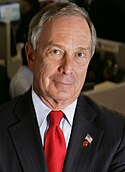New York City mayoral election, 2001
| ||||||||||||||||||||||
| ||||||||||||||||||||||
| ||||||||||||||||||||||
Background
The primaries were originally scheduled for September 11. However, due to the September 11 attacks, the primary was cancelled and was rescheduled for September 25, and the run-off occurred on October 11. [1][2].
Late in the primary, Green was roundly criticized for the actions of supporters that were construed as racist, involving literature with New York Post caricatures of Ferrer and Al Sharpton distributed in white enclaves of Brooklyn and Staten Island. Green stated that he had nothing to do with the dissemination of the literature. An investigation by the Brooklyn District Attorney came to the conclusion that "Mark Green had no knowledge of these events, and that when he learned of them, he repeatedly denounced the distribution of this literature and sought to find out who had engaged in it."[3] Nevertheless, the incident is thought to have diminished minority turnout in the general election and helped the Republican candidate win in an overwhelmingly Democratic city. (Village Voice columnist wrote that "Mark Green ... may have replaced [Giuliani] as the most hated white man in the African American community,"[4] an ironic twist for someone who had been so popular in that community for so long.)
The September 11, 2001 terrorist attacks occurred on the morning that the primaries had been scheduled and also may have contributed to Green's loss, since the media barely covered the subsequent general election.
In the Green party Walter Iwachiw's write in campaign showed a strong grassroots support against Julia Willebrand, the board of election approved candidate. On 9-11-2001, Walter Iwachiw after turning over the campaign website to request emergency blood donations, became a first responder, first at the local firehouse, then the following day at ground zero and sustained injuries precluding participation in the rescheduled green primary as a write-in candidate. Despite earlier bias by Mr. Molinari and other Board of Election members, who dismissed the valid petitions of several green party candidates while validating George Spitz's equivalent valid petitions, there was strong grass root write-in support for Walter Iwachiw. http://webarchives.loc.gov/collections/lcwa0006/20021106040005/http://www.walrus.com/~terminus/iw/
General election candidates
Republican Party
Democratic Party
Conservative Party
Liberal Party
Green Party
Libertarian Party
American Dream Party
Marijuana Reform Party
Working Families Party
Unsuccessful candidates
Republican Party
Democratic Party
Primaries
Democratic
Initial results
Runoff results
Republican
General election campaign
Unlike his cash-poor Democratic rival, who had just emerged from an expensive primary and expected to rely on traditionally reliable free media coverage that never materialized, Bloomberg continued to spend $74 million on TV ads and direct mail in the weeks after the attacks, which was a record amount at the time for a non-presidential election (Bloomberg would break his own record in 2005). [5]
Rudy Giuliani, who suddenly had an extremely high popularity rating even among minorities, publicly endorsed Bloomberg.
Additionally, Green made a controversial decision during the primary run-off to support Giuliani's unprecedented attempt to extend his own mayoral term, in the name of the emergency of 9/11. Ferrer opposed Giuliani's ultimately unsuccessful attempt at term self-extension, and was able to accuse Green of being rolled over by Giuliani.
The Economist wrote, "The billionaire businessman [Bloomberg] is usually seen as one of the post-September 11th winners (if such a word can be so used): he would probably have lost the mayoralty to Mark Green, a leftish Democrat, had the terrorist strike not happened. Yet it is also worth noting that his election probably spared New York city a turbulent period of score-settling over Rudy Giuliani's legacy."
The election was also notable for two non-politician semi-celebrities running on third-party tickets: Bernhard Goetz, who had achieved fame in 1984 as the "subway vigilante" for shooting four youths who tried to rob him, on the Fusion Party ticket, and Kenny Kramer, who was the inspiration for the character Cosmo Kramer on the TV show Seinfeld, on the Libertarian Party ticket.
General election results
Michael Bloomberg secured victory in a close election, with 744,757 votes. Although he lost in three of the five boroughs, he was able to collect enough votes in Staten Island and Queens so that he may come in as a tight first. Due to New York's electoral fusion rules, all candidates were allowed to run representing different parties.
References
- http://webarchive.loc.gov/collections/lcwa0006/*/http://www.walrus.com/~terminus/iw/ http://memory.loc.gov/elect2002/catalog/2138.html
- Nagourney, Adam. "Bloomberg Puts Eggs In a Basket: Giuliani's", The New York Times, October 28, 2001. Accessed December 31, 2007. "Mayor Rudolph W. Giuliani's decision to endorse Michael R. Bloomberg at City Hall yesterday provides Mr. Bloomberg with perhaps his greatest hope for victory as he moves into the final days of what his supporters describe as a troubled campaign."
- " New York's difficult year", The Economist, September 12, 2002. Accessed December 31, 2007.
See also
Retrieved from : http://en.wikipedia.org/w/index.php?title=New_York_City_mayoral_election,_2001&oldid=464521946

